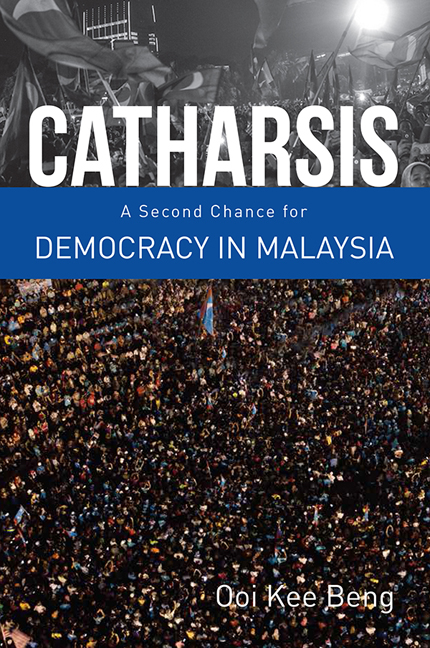Book contents
- Frontmatter
- Contents
- Foreword
- 1 Introduction – Malaysia's Future Is Redeemed
- Before Pakatan Harapan
- Before 9 May 2018
- 12 Racialising the Un-racialisable: What Is the Red Shirt Rally All About?
- 13 One Country's Merdeka Is Another's Damage Control
- 14 Malaysia – Where Politics Must Be Ethnically Inclusive and Exclusive at the Same Time
- 15 Is Malaysia at a Crossroads or in a Quagmire?
- 16 Unity Without Solidarity Sows Disunity
- 17 UMNO and Looking Back at History
- 18 Sarawak Forces Federal Opposition to Do Deep Soul-searching. But Can It?
- 19 By-elections Reveal New Malay Politics
- 20 Interview with Mahathir Mohamad: ‘People Must Be Able to Hold Their Heads Up.’
- 21 Malaysia Has to Start Re-examining Its Histories
- 22 Waves from US Probe into 1MDB May Turn into Tsunami
- 23 Seeking a New Formula to Unite Malaysia's Diversity
- 24 Time for Anwar to Accept Mahathir's Olive Branch?
- 25 Najib, Mahathir and the Timing of Malaysia's Polls
- 26 Excessive Governance Is Not Good Governance
- 27 Why Malaysia's Opposition Will Take to the Streets Again
- 28 Merdeka is About The Individual, Too
- 29 A Battle Between Malay Leaders Over Malaysia's Future
- 30 The Primacy of Political Economy in Asia
- With Mahathir at the Helm
- Beyond 9 May 2018
- About the Author
26 - Excessive Governance Is Not Good Governance
from Before 9 May 2018
Published online by Cambridge University Press: 12 February 2019
- Frontmatter
- Contents
- Foreword
- 1 Introduction – Malaysia's Future Is Redeemed
- Before Pakatan Harapan
- Before 9 May 2018
- 12 Racialising the Un-racialisable: What Is the Red Shirt Rally All About?
- 13 One Country's Merdeka Is Another's Damage Control
- 14 Malaysia – Where Politics Must Be Ethnically Inclusive and Exclusive at the Same Time
- 15 Is Malaysia at a Crossroads or in a Quagmire?
- 16 Unity Without Solidarity Sows Disunity
- 17 UMNO and Looking Back at History
- 18 Sarawak Forces Federal Opposition to Do Deep Soul-searching. But Can It?
- 19 By-elections Reveal New Malay Politics
- 20 Interview with Mahathir Mohamad: ‘People Must Be Able to Hold Their Heads Up.’
- 21 Malaysia Has to Start Re-examining Its Histories
- 22 Waves from US Probe into 1MDB May Turn into Tsunami
- 23 Seeking a New Formula to Unite Malaysia's Diversity
- 24 Time for Anwar to Accept Mahathir's Olive Branch?
- 25 Najib, Mahathir and the Timing of Malaysia's Polls
- 26 Excessive Governance Is Not Good Governance
- 27 Why Malaysia's Opposition Will Take to the Streets Again
- 28 Merdeka is About The Individual, Too
- 29 A Battle Between Malay Leaders Over Malaysia's Future
- 30 The Primacy of Political Economy in Asia
- With Mahathir at the Helm
- Beyond 9 May 2018
- About the Author
Summary
The word ‘Governance’ has the same roots as ‘Government’. However, the recent popularity of the use of ‘governance’ comes from the growing notion of looking at political control as a technical matter and of an increasing tendency to think of the government – and the governing – of a country as the management – and the managing – of a country.
We should also be aware that governance seems more at home in the context of corporations, and in line with that, the word assumes the existence of the entity to be unproblematic – be it a state or a corporation.
For countries and states that are relatively new and that are still being ‘built’, the increasing usage of ‘governance’ may be in response to the initial and over time, excessive focus on the notion of nationbuilding rather than on state building.
Governance as a notion necessarily highlights rules and regulations, technocratic mechanisms and corrective procedures. Except where security is a concern, it is of great advantage that information is free and reliable since policies have to be based on them – as are punishments.
So what constitutes Good Governance on the part of a national government?
I would deconstruct the term into the following related processes:
State building (developing and maintaining the apparatus of the state);
Nation building (managing inter-ethnic ties; developing a sense of national belonging; handling extra-national relations);
National-economy building (integrating economic activities within the country; managing budget income and expenditure; investing for growth and economic stability);
Improving the socio-economic situation of the citizenry and maintaining a promise of a stable and better future;
Managing the relationship between state and citizenry (Rakyat), such that security and justice; freedom from fear; and protection from arbitrary power are maximised.
Each of these involves complicated and often strongly inter-linked itineraries. The focus differs from country to country and from regime to regime, and necessarily shifts over time as well.
The important point being made here is that the historical context of any given case must be considered in deciding what good governance is and is not.
Where building a state is concerned, the focus is mainly on technocratic capability and legal reliability. Building a nation, which is the more commonly adopted notion, deals more with the emotive aspects of social harmony and with matters of identity.
- Type
- Chapter
- Information
- CatharsisA Second Chance for Democracy in Malaysia, pp. 92 - 94Publisher: ISEAS–Yusof Ishak InstitutePrint publication year: 2018

